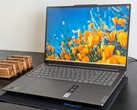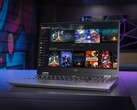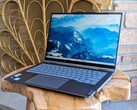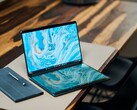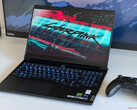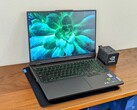Core Ultra 5 125U performance debut: Lenovo Yoga 7 2-in-1 16IML9 convertible review

The Lenovo Yoga 7 2-in-1 16IML9 (or Yoga 7 2-in-1 16 G9) succeeds last year's budget Yoga 7 2-in-1 G8 by introducing new Meteor Lake-U processors. The chassis is otherwise the same and so we recommend checking out our review on the Yoga 7 2-in-1 G8 to learn more about the physical features of the model.
Our test unit is the base configuration with the Core Ultra 5 125U CPU for approximately $900 USD retail. A higher-end option is also available with the Core Ultra 7 155U, but all SKUs at the moment come with the same 1920 x 1200 IPS touchscreen and 16 GB of fast LPDDR5x-7467 soldered RAM.
Alternatives to the Yoga 7 2-in-1 16 G9 include other 16-inch multimedia convertibles like the Dell Inspiron 16 7635 2-in-1 or the upcoming HP Envy x360 16.
More Lenovo reviews:
Potential Competitors in Comparison
Rating | Date | Model | Weight | Height | Size | Resolution | Price |
|---|---|---|---|---|---|---|---|
| 86.7 % v7 (old) | 04 / 2024 | Lenovo Yoga 7 2-in-1 16IML9 Ultra 5 125U, Graphics 4-Core iGPU (Arrow Lake) | 2.1 kg | 16.99 mm | 16.00" | 1920x1200 | |
| 85.8 % v7 (old) | 04 / 2023 | Lenovo Yoga 7 16IRL8 i7-1355U, Iris Xe G7 96EUs | 2 kg | 16.99 mm | 16.00" | 1920x1200 | |
| 88.9 % v7 (old) | 04 / 2024 | Samsung Galaxy Book4 Pro 16 Ultra 7 155H, Arc 8-Core | 1.5 kg | 12.5 mm | 16.00" | 2880x1800 | |
| 88.7 % v7 (old) | 02 / 2024 | HP Pavilion Plus 16-ab0456tx i7-13700H, GeForce RTX 3050 6GB Laptop GPU | 1.9 kg | 19.9 mm | 16.00" | 2560x1600 | |
| 85.8 % v7 (old) | 11 / 2023 | LG Gram 2in1 16 16T90R - G.AA78G i7-1360P, Iris Xe G7 96EUs | 1.5 kg | 17.2 mm | 16.00" | 2560x1600 | |
| 84.6 % v7 (old) | 07 / 2023 | Dell Inspiron 16 7635 2-in-1 R5 7530U, Vega 7 | 2 kg | 18.99 mm | 16.00" | 1920x1200 |
Case — Now With Microsoft Co-Pilot
The easiest way to distinguish between the 2024 model from the 2023 model is to look for the new Co-Pilot key on the keyboard. There are otherwise no visual differences from the 2023 design.
Connectivity
SD Card Reader
| SD Card Reader | |
| average JPG Copy Test (av. of 3 runs) | |
| Lenovo Yoga 7 2-in-1 16IML9 (AV Pro SD microSD 128 GB V60) | |
| Samsung Galaxy Book4 Pro 16 (Angelbird AV Pro V60) | |
| Lenovo Yoga 7 16IRL8 (AV Pro SD microSD 128 GB V60) | |
| Dell Inspiron 16 7635 2-in-1 (PNY EliteX-Pro60 V60 256 GB) | |
| LG Gram 2in1 16 16T90R - G.AA78G | |
| maximum AS SSD Seq Read Test (1GB) | |
| Lenovo Yoga 7 16IRL8 (AV Pro SD microSD 128 GB V60) | |
| Lenovo Yoga 7 2-in-1 16IML9 (AV Pro SD microSD 128 GB V60) | |
| Samsung Galaxy Book4 Pro 16 (Angelbird AV Pro V60) | |
| Dell Inspiron 16 7635 2-in-1 (PNY EliteX-Pro60 V60 256 GB) | |
| LG Gram 2in1 16 16T90R - G.AA78G | |
Communication
Webcam

Maintenance
Display
No new display options are available meaning all configurations are still using the same IPS panel as found on the 2023 model. This particular panel covers only ~60% of sRGB (i.e., 45% NTSC) which automatically categorizes it as a lower-end budget panel. Most other 16-inch laptops offer full sRGB coverage in comparison including even the similarly priced Dell Inspiron 16 7635 2-in-1.
| |||||||||||||||||||||||||
Brightness Distribution: 82 %
Center on Battery: 313.3 cd/m²
Contrast: 895:1 (Black: 0.35 cd/m²)
ΔE ColorChecker Calman: 4.41 | ∀{0.5-29.43 Ø4.77}
calibrated: 1.84
ΔE Greyscale Calman: 4.4 | ∀{0.09-98 Ø5}
42.3% AdobeRGB 1998 (Argyll 3D)
61.4% sRGB (Argyll 3D)
40.9% Display P3 (Argyll 3D)
Gamma: 2.3
CCT: 7395 K
| Lenovo Yoga 7 2-in-1 16IML9 LEN160FHD, IPS, 1920x1200, 16" | Lenovo Yoga 7 16IRL8 LEN160FHD, IPS, 1920x1200, 16" | Samsung Galaxy Book4 Pro 16 ATNA60CL07-0, OLED, 2880x1800, 16" | HP Pavilion Plus 16-ab0456tx AU Optronics AUOFDA4, IPS, 2560x1600, 16" | LG Gram 2in1 16 16T90R - G.AA78G LP160WQ1-SPB2, IPS, 2560x1600, 16" | Dell Inspiron 16 7635 2-in-1 Chi Mei 160JCA, IPS, 1920x1200, 16" | |
|---|---|---|---|---|---|---|
| Display | 3% | 112% | 75% | 100% | 63% | |
| Display P3 Coverage (%) | 40.9 | 42 3% | 99.5 143% | 74.6 82% | 96.5 136% | 67.4 65% |
| sRGB Coverage (%) | 61.4 | 62.8 2% | 100 63% | 99 61% | 99.9 63% | 98.2 60% |
| AdobeRGB 1998 Coverage (%) | 42.3 | 43.5 3% | 97.5 130% | 76.5 81% | 84.6 100% | 69.5 64% |
| Response Times | 3% | 98% | 71% | -9% | 16% | |
| Response Time Grey 50% / Grey 80% * (ms) | 32.1 ? | 31.8 ? 1% | 0.64 ? 98% | 9.06 ? 72% | 38.4 ? -20% | 27.6 ? 14% |
| Response Time Black / White * (ms) | 21.8 ? | 20.9 ? 4% | 0.68 ? 97% | 6.7 ? 69% | 21.4 ? 2% | 18.2 ? 17% |
| PWM Frequency (Hz) | 240 ? | |||||
| Screen | 4% | 51% | 23% | 9% | 22% | |
| Brightness middle (cd/m²) | 313.3 | 279.4 -11% | 385 23% | 403 29% | 329 5% | 301.3 -4% |
| Brightness (cd/m²) | 294 | 257 -13% | 391 33% | 394 34% | 310 5% | 269 -9% |
| Brightness Distribution (%) | 82 | 81 -1% | 97 18% | 90 10% | 88 7% | 79 -4% |
| Black Level * (cd/m²) | 0.35 | 0.18 49% | 0.34 3% | 0.39 -11% | 0.28 20% | |
| Contrast (:1) | 895 | 1552 73% | 1185 32% | 844 -6% | 1076 20% | |
| Colorchecker dE 2000 * | 4.41 | 5.12 -16% | 1.1 75% | 3.13 29% | 3.52 20% | 3.1 30% |
| Colorchecker dE 2000 max. * | 15.75 | 19.42 -23% | 1.8 89% | 6.14 61% | 6.96 56% | 5.5 65% |
| Colorchecker dE 2000 calibrated * | 1.84 | 1.84 -0% | 1.65 10% | 1.15 37% | 0.49 73% | |
| Greyscale dE 2000 * | 4.4 | 5.5 -25% | 1.4 68% | 4.5 -2% | 5.75 -31% | 3.9 11% |
| Gamma | 2.3 96% | 2.22 99% | 2.24 98% | 2.18 101% | 2.137 103% | 2.19 100% |
| CCT | 7395 88% | 6407 101% | 6444 101% | 6261 104% | 7584 86% | 6186 105% |
| Total Average (Program / Settings) | 3% /
3% | 87% /
76% | 56% /
41% | 33% /
26% | 34% /
30% |
* ... smaller is better
Color temperature is slightly too cool out of the box. We recommend applying our calibrated ICM profile above to improve colors closer to the sRGB standard.
Display Response Times
| ↔ Response Time Black to White | ||
|---|---|---|
| 21.8 ms ... rise ↗ and fall ↘ combined | ↗ 12.6 ms rise | |
| ↘ 9.2 ms fall | ||
| The screen shows good response rates in our tests, but may be too slow for competitive gamers. In comparison, all tested devices range from 0.1 (minimum) to 240 (maximum) ms. » 47 % of all devices are better. This means that the measured response time is similar to the average of all tested devices (20.2 ms). | ||
| ↔ Response Time 50% Grey to 80% Grey | ||
| 32.1 ms ... rise ↗ and fall ↘ combined | ↗ 15.3 ms rise | |
| ↘ 16.8 ms fall | ||
| The screen shows slow response rates in our tests and will be unsatisfactory for gamers. In comparison, all tested devices range from 0.165 (minimum) to 636 (maximum) ms. » 43 % of all devices are better. This means that the measured response time is similar to the average of all tested devices (31.6 ms). | ||
Screen Flickering / PWM (Pulse-Width Modulation)
| Screen flickering / PWM not detected | |||
In comparison: 53 % of all tested devices do not use PWM to dim the display. If PWM was detected, an average of 8073 (minimum: 5 - maximum: 343500) Hz was measured. | |||
Performance — Meteor Lake-U For AI Acceleration
Testing Conditions
Processor
Raw performance from the Core Ultra 5 125U is nearly identical to last year's Core i5-1335U even though the newer CPU serves as a direct replacement. In fact, the older Core i7-1355U as found on the Yoga 7 2-in-1 16IRL8 can outperform the Core Ultra 5 125U by 5 to 10 percent. Users who prefer the Core Ultra 5 125U should therefore be drawn to its integrated NPU to help accelerate certain AI tasks coming to Windows in the near future.
Upgrading to the Core Ultra 7 155U configuration is only expected to increase performance just marginally based on our time with the Yoga Book 9.
Cinebench R15 Multi Loop
Cinebench R23: Multi Core | Single Core
Cinebench R20: CPU (Multi Core) | CPU (Single Core)
Cinebench R15: CPU Multi 64Bit | CPU Single 64Bit
Blender: v2.79 BMW27 CPU
7-Zip 18.03: 7z b 4 | 7z b 4 -mmt1
Geekbench 6.5: Multi-Core | Single-Core
Geekbench 5.5: Multi-Core | Single-Core
HWBOT x265 Benchmark v2.2: 4k Preset
LibreOffice : 20 Documents To PDF
R Benchmark 2.5: Overall mean
| Geekbench 6.5 / Multi-Core | |
| Lenovo Yoga Pro 9 16IMH9 | |
| Lenovo ThinkPad Z16 Gen 2 | |
| Samsung Galaxy Book4 Pro 16 | |
| HP Pavilion Plus 16-ab0456tx | |
| LG Gram 2in1 16 16T90R - G.AA78G | |
| Lenovo Yoga 7 2-in-1 16IML9 | |
| Average Intel Core Ultra 5 125U (8384 - 9601, n=8) | |
| Lenovo Thinkpad X1 Fold 16 | |
| Lenovo ThinkPad E16 G1 Core i5-1335U | |
| Geekbench 6.5 / Single-Core | |
| Lenovo ThinkPad Z16 Gen 2 | |
| HP Pavilion Plus 16-ab0456tx | |
| Lenovo Yoga Pro 9 16IMH9 | |
| Samsung Galaxy Book4 Pro 16 | |
| LG Gram 2in1 16 16T90R - G.AA78G | |
| Lenovo Thinkpad X1 Fold 16 | |
| Average Intel Core Ultra 5 125U (2129 - 2177, n=8) | |
| Lenovo Yoga 7 2-in-1 16IML9 | |
Cinebench R23: Multi Core | Single Core
Cinebench R20: CPU (Multi Core) | CPU (Single Core)
Cinebench R15: CPU Multi 64Bit | CPU Single 64Bit
Blender: v2.79 BMW27 CPU
7-Zip 18.03: 7z b 4 | 7z b 4 -mmt1
Geekbench 6.5: Multi-Core | Single-Core
Geekbench 5.5: Multi-Core | Single-Core
HWBOT x265 Benchmark v2.2: 4k Preset
LibreOffice : 20 Documents To PDF
R Benchmark 2.5: Overall mean
* ... smaller is better
AIDA64: FP32 Ray-Trace | FPU Julia | CPU SHA3 | CPU Queen | FPU SinJulia | FPU Mandel | CPU AES | CPU ZLib | FP64 Ray-Trace | CPU PhotoWorxx
| Performance rating | |
| HP Pavilion Plus 16-ab0456tx | |
| Samsung Galaxy Book4 Pro 16 | |
| LG Gram 2in1 16 16T90R - G.AA78G | |
| Dell Inspiron 16 7635 2-in-1 | |
| Lenovo Yoga 7 2-in-1 16IML9 | |
| Average Intel Core Ultra 5 125U | |
| Lenovo Yoga 7 16IRL8 | |
| AIDA64 / FP32 Ray-Trace | |
| HP Pavilion Plus 16-ab0456tx | |
| Samsung Galaxy Book4 Pro 16 | |
| Dell Inspiron 16 7635 2-in-1 | |
| LG Gram 2in1 16 16T90R - G.AA78G | |
| LG Gram 2in1 16 16T90R - G.AA78G | |
| Lenovo Yoga 7 2-in-1 16IML9 | |
| Average Intel Core Ultra 5 125U (5784 - 9282, n=8) | |
| Lenovo Yoga 7 16IRL8 | |
| AIDA64 / FPU Julia | |
| HP Pavilion Plus 16-ab0456tx | |
| Samsung Galaxy Book4 Pro 16 | |
| Dell Inspiron 16 7635 2-in-1 | |
| LG Gram 2in1 16 16T90R - G.AA78G | |
| Lenovo Yoga 7 2-in-1 16IML9 | |
| Average Intel Core Ultra 5 125U (29578 - 47366, n=8) | |
| Lenovo Yoga 7 16IRL8 | |
| AIDA64 / CPU SHA3 | |
| Samsung Galaxy Book4 Pro 16 | |
| HP Pavilion Plus 16-ab0456tx | |
| LG Gram 2in1 16 16T90R - G.AA78G | |
| Average Intel Core Ultra 5 125U (1565 - 2669, n=8) | |
| Lenovo Yoga 7 2-in-1 16IML9 | |
| Lenovo Yoga 7 16IRL8 | |
| Dell Inspiron 16 7635 2-in-1 | |
| AIDA64 / CPU Queen | |
| HP Pavilion Plus 16-ab0456tx | |
| Samsung Galaxy Book4 Pro 16 | |
| LG Gram 2in1 16 16T90R - G.AA78G | |
| Dell Inspiron 16 7635 2-in-1 | |
| Lenovo Yoga 7 16IRL8 | |
| Lenovo Yoga 7 2-in-1 16IML9 | |
| Average Intel Core Ultra 5 125U (44976 - 47868, n=8) | |
| AIDA64 / FPU SinJulia | |
| Samsung Galaxy Book4 Pro 16 | |
| HP Pavilion Plus 16-ab0456tx | |
| Dell Inspiron 16 7635 2-in-1 | |
| LG Gram 2in1 16 16T90R - G.AA78G | |
| Lenovo Yoga 7 2-in-1 16IML9 | |
| Average Intel Core Ultra 5 125U (4390 - 5507, n=8) | |
| Lenovo Yoga 7 16IRL8 | |
| AIDA64 / FPU Mandel | |
| HP Pavilion Plus 16-ab0456tx | |
| Dell Inspiron 16 7635 2-in-1 | |
| Samsung Galaxy Book4 Pro 16 | |
| LG Gram 2in1 16 16T90R - G.AA78G | |
| Lenovo Yoga 7 2-in-1 16IML9 | |
| Average Intel Core Ultra 5 125U (14563 - 24922, n=8) | |
| Lenovo Yoga 7 16IRL8 | |
| AIDA64 / CPU AES | |
| LG Gram 2in1 16 16T90R - G.AA78G | |
| Samsung Galaxy Book4 Pro 16 | |
| HP Pavilion Plus 16-ab0456tx | |
| Lenovo Yoga 7 2-in-1 16IML9 | |
| Average Intel Core Ultra 5 125U (33640 - 48114, n=8) | |
| Lenovo Yoga 7 16IRL8 | |
| Dell Inspiron 16 7635 2-in-1 | |
| AIDA64 / CPU ZLib | |
| HP Pavilion Plus 16-ab0456tx | |
| Samsung Galaxy Book4 Pro 16 | |
| LG Gram 2in1 16 16T90R - G.AA78G | |
| Average Intel Core Ultra 5 125U (457 - 779, n=8) | |
| Lenovo Yoga 7 2-in-1 16IML9 | |
| Lenovo Yoga 7 16IRL8 | |
| Dell Inspiron 16 7635 2-in-1 | |
| AIDA64 / FP64 Ray-Trace | |
| HP Pavilion Plus 16-ab0456tx | |
| Samsung Galaxy Book4 Pro 16 | |
| LG Gram 2in1 16 16T90R - G.AA78G | |
| Dell Inspiron 16 7635 2-in-1 | |
| Lenovo Yoga 7 2-in-1 16IML9 | |
| Average Intel Core Ultra 5 125U (2904 - 4846, n=8) | |
| Lenovo Yoga 7 16IRL8 | |
| AIDA64 / CPU PhotoWorxx | |
| Samsung Galaxy Book4 Pro 16 | |
| Lenovo Yoga 7 2-in-1 16IML9 | |
| LG Gram 2in1 16 16T90R - G.AA78G | |
| Lenovo Yoga 7 16IRL8 | |
| HP Pavilion Plus 16-ab0456tx | |
| Average Intel Core Ultra 5 125U (24082 - 47875, n=8) | |
| Dell Inspiron 16 7635 2-in-1 | |
Stress Test
Core temperature is generally higher than what we recorded on last year's model by a few degrees C. When running Prime95 or Witcher 3, for example, the CPU would stabilize at 79 C and 68 C, respectively, compared to 64 C and 63 C on the Yoga 7 16IRL8. The CPU would spike to 4.1 GHz and 41 W when initiating Prime95 stress before quickly falling and stabilizing at 2.4 GHz and 28 W to demonstrate limited Turbo Boost sustainability.
| CPU Clock (GHz) | GPU Clock (MHz) | Average CPU Temperature (°C) | |
| System Idle | -- | -- | 44 |
| Prime95 Stress | ~2.8 | 400 | 79 |
| Prime95 + FurMark Stress | ~2.1 | 950 - 1450 | 74 |
| Witcher 3 Stress | ~0.4 | 1850 | 68 |
System Performance
CrossMark: Overall | Productivity | Creativity | Responsiveness
WebXPRT 3: Overall
WebXPRT 4: Overall
Mozilla Kraken 1.1: Total
| PCMark 10 / Score | |
| Samsung Galaxy Book4 Pro 16 | |
| HP Pavilion Plus 16-ab0456tx | |
| Dell Inspiron 16 7635 2-in-1 | |
| Lenovo Yoga 7 16IRL8 | |
| Lenovo Yoga 7 2-in-1 16IML9 | |
| Average Intel Core Ultra 5 125U, Intel Graphics 4-Core iGPU (Meteor / Arrow Lake) (5639 - 6052, n=8) | |
| LG Gram 2in1 16 16T90R - G.AA78G | |
| PCMark 10 / Essentials | |
| Lenovo Yoga 7 16IRL8 | |
| LG Gram 2in1 16 16T90R - G.AA78G | |
| Samsung Galaxy Book4 Pro 16 | |
| Lenovo Yoga 7 2-in-1 16IML9 | |
| Dell Inspiron 16 7635 2-in-1 | |
| Average Intel Core Ultra 5 125U, Intel Graphics 4-Core iGPU (Meteor / Arrow Lake) (9582 - 10827, n=8) | |
| HP Pavilion Plus 16-ab0456tx | |
| PCMark 10 / Productivity | |
| Dell Inspiron 16 7635 2-in-1 | |
| HP Pavilion Plus 16-ab0456tx | |
| Samsung Galaxy Book4 Pro 16 | |
| Average Intel Core Ultra 5 125U, Intel Graphics 4-Core iGPU (Meteor / Arrow Lake) (7548 - 8306, n=8) | |
| Lenovo Yoga 7 2-in-1 16IML9 | |
| Lenovo Yoga 7 16IRL8 | |
| LG Gram 2in1 16 16T90R - G.AA78G | |
| PCMark 10 / Digital Content Creation | |
| Samsung Galaxy Book4 Pro 16 | |
| HP Pavilion Plus 16-ab0456tx | |
| LG Gram 2in1 16 16T90R - G.AA78G | |
| Average Intel Core Ultra 5 125U, Intel Graphics 4-Core iGPU (Meteor / Arrow Lake) (6367 - 7087, n=8) | |
| Lenovo Yoga 7 16IRL8 | |
| Lenovo Yoga 7 2-in-1 16IML9 | |
| Dell Inspiron 16 7635 2-in-1 | |
| CrossMark / Overall | |
| HP Pavilion Plus 16-ab0456tx | |
| Samsung Galaxy Book4 Pro 16 | |
| Lenovo Yoga 7 2-in-1 16IML9 | |
| Lenovo Yoga 7 16IRL8 | |
| LG Gram 2in1 16 16T90R - G.AA78G | |
| Average Intel Core Ultra 5 125U, Intel Graphics 4-Core iGPU (Meteor / Arrow Lake) (1363 - 1648, n=8) | |
| Dell Inspiron 16 7635 2-in-1 | |
| CrossMark / Productivity | |
| Samsung Galaxy Book4 Pro 16 | |
| HP Pavilion Plus 16-ab0456tx | |
| Lenovo Yoga 7 16IRL8 | |
| LG Gram 2in1 16 16T90R - G.AA78G | |
| Average Intel Core Ultra 5 125U, Intel Graphics 4-Core iGPU (Meteor / Arrow Lake) (1310 - 1416, n=8) | |
| Lenovo Yoga 7 2-in-1 16IML9 | |
| Dell Inspiron 16 7635 2-in-1 | |
| CrossMark / Creativity | |
| HP Pavilion Plus 16-ab0456tx | |
| Samsung Galaxy Book4 Pro 16 | |
| Lenovo Yoga 7 16IRL8 | |
| LG Gram 2in1 16 16T90R - G.AA78G | |
| Average Intel Core Ultra 5 125U, Intel Graphics 4-Core iGPU (Meteor / Arrow Lake) (1433 - 1550, n=8) | |
| Lenovo Yoga 7 2-in-1 16IML9 | |
| Dell Inspiron 16 7635 2-in-1 | |
| CrossMark / Responsiveness | |
| Samsung Galaxy Book4 Pro 16 | |
| LG Gram 2in1 16 16T90R - G.AA78G | |
| HP Pavilion Plus 16-ab0456tx | |
| Lenovo Yoga 7 16IRL8 | |
| Average Intel Core Ultra 5 125U, Intel Graphics 4-Core iGPU (Meteor / Arrow Lake) (1066 - 1378, n=8) | |
| Lenovo Yoga 7 2-in-1 16IML9 | |
| Dell Inspiron 16 7635 2-in-1 | |
| WebXPRT 3 / Overall | |
| Lenovo Yoga 7 16IRL8 | |
| HP Pavilion Plus 16-ab0456tx | |
| Samsung Galaxy Book4 Pro 16 | |
| Dell Inspiron 16 7635 2-in-1 | |
| LG Gram 2in1 16 16T90R - G.AA78G | |
| Average Intel Core Ultra 5 125U, Intel Graphics 4-Core iGPU (Meteor / Arrow Lake) (237 - 253, n=8) | |
| Lenovo Yoga 7 2-in-1 16IML9 | |
| WebXPRT 4 / Overall | |
| HP Pavilion Plus 16-ab0456tx | |
| Samsung Galaxy Book4 Pro 16 | |
| Lenovo Yoga 7 16IRL8 | |
| Lenovo Yoga 7 2-in-1 16IML9 | |
| Average Intel Core Ultra 5 125U, Intel Graphics 4-Core iGPU (Meteor / Arrow Lake) (224 - 231, n=8) | |
| Dell Inspiron 16 7635 2-in-1 | |
| Mozilla Kraken 1.1 / Total | |
| LG Gram 2in1 16 16T90R - G.AA78G | |
| Dell Inspiron 16 7635 2-in-1 | |
| Lenovo Yoga 7 2-in-1 16IML9 | |
| Average Intel Core Ultra 5 125U, Intel Graphics 4-Core iGPU (Meteor / Arrow Lake) (579 - 594, n=8) | |
| Samsung Galaxy Book4 Pro 16 | |
| Lenovo Yoga 7 16IRL8 | |
| HP Pavilion Plus 16-ab0456tx | |
* ... smaller is better
| PCMark 10 Score | 5895 points | |
Help | ||
| AIDA64 / Memory Copy | |
| Samsung Galaxy Book4 Pro 16 | |
| Lenovo Yoga 7 2-in-1 16IML9 | |
| Average Intel Core Ultra 5 125U (35467 - 82786, n=8) | |
| HP Pavilion Plus 16-ab0456tx | |
| Lenovo Yoga 7 16IRL8 | |
| LG Gram 2in1 16 16T90R - G.AA78G | |
| Dell Inspiron 16 7635 2-in-1 | |
| AIDA64 / Memory Read | |
| Samsung Galaxy Book4 Pro 16 | |
| HP Pavilion Plus 16-ab0456tx | |
| Lenovo Yoga 7 2-in-1 16IML9 | |
| Lenovo Yoga 7 16IRL8 | |
| LG Gram 2in1 16 16T90R - G.AA78G | |
| Average Intel Core Ultra 5 125U (38849 - 63159, n=8) | |
| Dell Inspiron 16 7635 2-in-1 | |
| AIDA64 / Memory Write | |
| Lenovo Yoga 7 16IRL8 | |
| HP Pavilion Plus 16-ab0456tx | |
| LG Gram 2in1 16 16T90R - G.AA78G | |
| Samsung Galaxy Book4 Pro 16 | |
| Lenovo Yoga 7 2-in-1 16IML9 | |
| Average Intel Core Ultra 5 125U (36830 - 63484, n=8) | |
| Dell Inspiron 16 7635 2-in-1 | |
| AIDA64 / Memory Latency | |
| Lenovo Yoga 7 2-in-1 16IML9 | |
| Average Intel Core Ultra 5 125U (125.5 - 153.2, n=8) | |
| Samsung Galaxy Book4 Pro 16 | |
| LG Gram 2in1 16 16T90R - G.AA78G | |
| Dell Inspiron 16 7635 2-in-1 | |
| Lenovo Yoga 7 16IRL8 | |
| HP Pavilion Plus 16-ab0456tx | |
* ... smaller is better
DPC Latency
| DPC Latencies / LatencyMon - interrupt to process latency (max), Web, Youtube, Prime95 | |
| LG Gram 2in1 16 16T90R - G.AA78G | |
| HP Pavilion Plus 16-ab0456tx | |
| Samsung Galaxy Book4 Pro 16 | |
| Lenovo Yoga 7 16IRL8 | |
| Lenovo Yoga 7 2-in-1 16IML9 | |
| Dell Inspiron 16 7635 2-in-1 | |
* ... smaller is better
Storage Devices
Our unit ships with the SK Hynix HFS512GEJ4X112N whereas last year's model would ship with the Western Digital PC SN740. Unfortunately, the SK Hynix drive is slightly slower and it would even exhibit transfer rate issues when stressed with DiskSpd as shown by our graph below. The short dips in performance would occur even after repeat testing to confirm their reproducibility. The issue thankfully does not impact day-to-day usage, but it is unwelcoming to see nonetheless.
* ... smaller is better
Disk Throttling: DiskSpd Read Loop, Queue Depth 8
GPU Performance
As mentioned in our Yoga Book 9 review, the integrated Arc 4 performs almost identically to the older Iris Xe 96 EUs while being above the Iris Xe 80 EUs by about 30 percent. Only the Arc 8 series can provide a more significant year-over-year boost in performance, but such an option is only available on Core Ultra-H processors; the Yoga 7 2-in-1 16IML9 ships with just Core Ultra-U processors.
| Power Profile | Graphics Score | Physics Score | Combined Score |
| Performance Mode | 4786 | 19672 | 1816 |
| Balanced Mode | 4568 (-5%) | 19430 | 1778 |
| Battery Power | 4870 | 19706 | 1709 |
Running on Balanced mode or battery power entails no major performance deficits as shown by our Fire Strike results table above.
| 3DMark 11 Performance | 7264 points | |
| 3DMark Cloud Gate Standard Score | 21927 points | |
| 3DMark Fire Strike Score | 4557 points | |
| 3DMark Time Spy Score | 1919 points | |
Help | ||
* ... smaller is better
| Performance rating - Percent | |
| HP Pavilion Plus 16-ab0456tx | |
| Samsung Galaxy Book4 Pro 16 | |
| Lenovo Yoga 7 16IRL8 -1! | |
| LG Gram 2in1 16 16T90R - G.AA78G | |
| Lenovo Yoga 7 2-in-1 16IML9 | |
| Dell Inspiron 16 7635 2-in-1 | |
| The Witcher 3 - 1920x1080 Ultra Graphics & Postprocessing (HBAO+) | |
| HP Pavilion Plus 16-ab0456tx | |
| Samsung Galaxy Book4 Pro 16 | |
| Dell Inspiron 16 7635 2-in-1 | |
| Lenovo Yoga 7 16IRL8 | |
| Lenovo Yoga 7 2-in-1 16IML9 | |
| LG Gram 2in1 16 16T90R - G.AA78G | |
| Final Fantasy XV Benchmark - 1920x1080 High Quality | |
| HP Pavilion Plus 16-ab0456tx | |
| Samsung Galaxy Book4 Pro 16 | |
| Lenovo Yoga 7 16IRL8 | |
| LG Gram 2in1 16 16T90R - G.AA78G | |
| Lenovo Yoga 7 2-in-1 16IML9 | |
| Dell Inspiron 16 7635 2-in-1 | |
| Strange Brigade - 1920x1080 ultra AA:ultra AF:16 | |
| HP Pavilion Plus 16-ab0456tx | |
| Samsung Galaxy Book4 Pro 16 | |
| Lenovo Yoga 7 2-in-1 16IML9 | |
| LG Gram 2in1 16 16T90R - G.AA78G | |
| Dell Inspiron 16 7635 2-in-1 | |
| Dota 2 Reborn - 1920x1080 ultra (3/3) best looking | |
| HP Pavilion Plus 16-ab0456tx | |
| Samsung Galaxy Book4 Pro 16 | |
| LG Gram 2in1 16 16T90R - G.AA78G | |
| Lenovo Yoga 7 16IRL8 | |
| Lenovo Yoga 7 2-in-1 16IML9 | |
| Dell Inspiron 16 7635 2-in-1 | |
| X-Plane 11.11 - 1920x1080 high (fps_test=3) | |
| HP Pavilion Plus 16-ab0456tx | |
| Lenovo Yoga 7 16IRL8 | |
| LG Gram 2in1 16 16T90R - G.AA78G | |
| Samsung Galaxy Book4 Pro 16 | |
| Dell Inspiron 16 7635 2-in-1 | |
| Lenovo Yoga 7 2-in-1 16IML9 | |
| Baldur's Gate 3 | |
| 1920x1080 Low Preset AA:SM | |
| Lenovo Yoga Pro 9 16IMH9 | |
| Lenovo ThinkPad Z16 Gen 2 | |
| Average Intel Graphics 4-Core iGPU (Meteor / Arrow Lake) (14.7 - 21.9, n=27) | |
| Lenovo Yoga 7 2-in-1 16IML9 | |
| 1920x1080 Medium Preset AA:T | |
| Lenovo Yoga Pro 9 16IMH9 | |
| Lenovo ThinkPad Z16 Gen 2 | |
| Average Intel Graphics 4-Core iGPU (Meteor / Arrow Lake) (11.9 - 16.8, n=25) | |
| 1920x1080 High Preset AA:T | |
| Lenovo Yoga Pro 9 16IMH9 | |
| Lenovo ThinkPad Z16 Gen 2 | |
| Average Intel Graphics 4-Core iGPU (Meteor / Arrow Lake) (10.4 - 14.7, n=23) | |
| 1920x1080 Ultra Preset AA:T | |
| Lenovo Yoga Pro 9 16IMH9 | |
| Lenovo ThinkPad Z16 Gen 2 | |
| Average Intel Graphics 4-Core iGPU (Meteor / Arrow Lake) (9.7 - 14.2, n=23) | |
Witcher 3 FPS Chart
| low | med. | high | ultra | |
|---|---|---|---|---|
| The Witcher 3 (2015) | 86.8 | 49.6 | 28.4 | 15 |
| Dota 2 Reborn (2015) | 101.9 | 60.7 | 61.1 | 57.6 |
| Final Fantasy XV Benchmark (2018) | 37.6 | 23 | 16.3 | |
| X-Plane 11.11 (2018) | 36.5 | 28 | 23.4 | |
| Far Cry 5 (2018) | 46 | 25 | 25 | 23 |
| Strange Brigade (2018) | 120.4 | 50 | 39.2 | 30.2 |
| Tiny Tina's Wonderlands (2022) | 29.9 | 24 | 16.1 | 12.7 |
| F1 22 (2022) | 41.7 | 39.7 | ||
| Baldur's Gate 3 (2023) | 15.4 | |||
| Cyberpunk 2077 (2023) | 20.9 | 16.9 | 14.3 | 12.5 |
Emissions — Quieter, But Warmer
System Noise
Fan noise is quieter than on last year's model which is likely related to the lower power consumption of Meteor Lake-U and slightly warmer core temperatures. When running 3DMark 06, for example, our 2024 model can stay much quieter for longer periods compared to the 2023 model and the same applies for gaming loads as well. The temporary maximum of >40 dB(A) can still be reached when running Prime95.
Noise level
| Idle |
| 22.8 / 22.8 / 22.8 dB(A) |
| Load |
| 30.8 / 40.8 dB(A) |
 | ||
30 dB silent 40 dB(A) audible 50 dB(A) loud |
||
min: | ||
| Lenovo Yoga 7 2-in-1 16IML9 Graphics 4-Core iGPU (Arrow Lake), Ultra 5 125U, SK hynix HFS512GEJ4X112N | Lenovo Yoga 7 16IRL8 Iris Xe G7 96EUs, i7-1355U, WD PC SN740 512GB SDDPMQD-512G-1101 | Samsung Galaxy Book4 Pro 16 Arc 8-Core, Ultra 7 155H, Samsung PM9B1 512GB MZVL4512HBLU | HP Pavilion Plus 16-ab0456tx GeForce RTX 3050 6GB Laptop GPU, i7-13700H, WDC PC SN810 1TB | LG Gram 2in1 16 16T90R - G.AA78G Iris Xe G7 96EUs, i7-1360P, Samsung PM9A1 MZVL21T0HCLR | Dell Inspiron 16 7635 2-in-1 Vega 7, R5 7530U, Kioxia BG5 KBG50ZNS512G | |
|---|---|---|---|---|---|---|
| Noise | -13% | -14% | -9% | -10% | -14% | |
| off / environment * (dB) | 22.8 | 22.8 -0% | 24.6 -8% | 22.22 3% | 25.1 -10% | 23.6 -4% |
| Idle Minimum * (dB) | 22.8 | 22.9 -0% | 24.6 -8% | 22.22 3% | 25.1 -10% | 23.6 -4% |
| Idle Average * (dB) | 22.8 | 22.9 -0% | 24.6 -8% | 22.22 3% | 25.1 -10% | 23.6 -4% |
| Idle Maximum * (dB) | 22.8 | 26.9 -18% | 26.4 -16% | 22.22 3% | 26.1 -14% | 23.6 -4% |
| Load Average * (dB) | 30.8 | 41.7 -35% | 40 -30% | 42.03 -36% | 31.4 -2% | 40.3 -31% |
| Witcher 3 ultra * (dB) | 31 | 41.5 -34% | 40 -29% | 42.1 -36% | 41.1 -33% | 44.2 -43% |
| Load Maximum * (dB) | 40.8 | 43.6 -7% | 40 2% | 42.1 -3% | 36.6 10% | 44.2 -8% |
* ... smaller is better
Temperature
Surface temperatures are warmest on the left side of the system where hot spots can reach 38 C on both the top and bottom. This is only slightly cooler than on the pricier Galaxy Book4 Pro 16 which ships with the much faster Core Ultra 7 155H.
(+) The maximum temperature on the upper side is 37.8 °C / 100 F, compared to the average of 35.3 °C / 96 F, ranging from 19.6 to 60 °C for the class Convertible.
(+) The bottom heats up to a maximum of 38.8 °C / 102 F, compared to the average of 36.8 °C / 98 F
(+) In idle usage, the average temperature for the upper side is 24.2 °C / 76 F, compared to the device average of 30.3 °C / 87 F.
(+) The palmrests and touchpad are cooler than skin temperature with a maximum of 29.6 °C / 85.3 F and are therefore cool to the touch.
(±) The average temperature of the palmrest area of similar devices was 27.9 °C / 82.2 F (-1.7 °C / -3.1 F).
| Lenovo Yoga 7 2-in-1 16IML9 Intel Core Ultra 5 125U, Intel Graphics 4-Core iGPU (Meteor / Arrow Lake) | Lenovo Yoga 7 16IRL8 Intel Core i7-1355U, Intel Iris Xe Graphics G7 96EUs | Samsung Galaxy Book4 Pro 16 Intel Core Ultra 7 155H, Intel Arc 8-Core iGPU | HP Pavilion Plus 16-ab0456tx Intel Core i7-13700H, NVIDIA GeForce RTX 3050 6GB Laptop GPU | LG Gram 2in1 16 16T90R - G.AA78G Intel Core i7-1360P, Intel Iris Xe Graphics G7 96EUs | Dell Inspiron 16 7635 2-in-1 AMD Ryzen 5 7530U, AMD Radeon RX Vega 7 | |
|---|---|---|---|---|---|---|
| Heat | -9% | -2% | -34% | -35% | -9% | |
| Maximum Upper Side * (°C) | 37.8 | 37.6 1% | 40.9 -8% | 49.6 -31% | 55 -46% | 41.6 -10% |
| Maximum Bottom * (°C) | 38.8 | 40 -3% | 42.6 -10% | 45.8 -18% | 55.4 -43% | 39 -1% |
| Idle Upper Side * (°C) | 25.4 | 30.4 -20% | 24.5 4% | 39.2 -54% | 34.9 -37% | 29.4 -16% |
| Idle Bottom * (°C) | 26.8 | 30.6 -14% | 24.8 7% | 35.4 -32% | 30 -12% | 28.6 -7% |
* ... smaller is better
Lenovo Yoga 7 2-in-1 16IML9 audio analysis
(±) | speaker loudness is average but good (79.9 dB)
Bass 100 - 315 Hz
(-) | nearly no bass - on average 15.7% lower than median
(±) | linearity of bass is average (7.2% delta to prev. frequency)
Mids 400 - 2000 Hz
(+) | balanced mids - only 4.3% away from median
(+) | mids are linear (4.8% delta to prev. frequency)
Highs 2 - 16 kHz
(+) | balanced highs - only 2.6% away from median
(+) | highs are linear (6.3% delta to prev. frequency)
Overall 100 - 16.000 Hz
(+) | overall sound is linear (14.9% difference to median)
Compared to same class
» 23% of all tested devices in this class were better, 4% similar, 73% worse
» The best had a delta of 6%, average was 20%, worst was 57%
Compared to all devices tested
» 19% of all tested devices were better, 4% similar, 76% worse
» The best had a delta of 4%, average was 24%, worst was 134%
Apple MacBook Pro 16 2021 M1 Pro audio analysis
(+) | speakers can play relatively loud (84.7 dB)
Bass 100 - 315 Hz
(+) | good bass - only 3.8% away from median
(+) | bass is linear (5.2% delta to prev. frequency)
Mids 400 - 2000 Hz
(+) | balanced mids - only 1.3% away from median
(+) | mids are linear (2.1% delta to prev. frequency)
Highs 2 - 16 kHz
(+) | balanced highs - only 1.9% away from median
(+) | highs are linear (2.7% delta to prev. frequency)
Overall 100 - 16.000 Hz
(+) | overall sound is linear (4.6% difference to median)
Compared to same class
» 0% of all tested devices in this class were better, 0% similar, 100% worse
» The best had a delta of 5%, average was 17%, worst was 45%
Compared to all devices tested
» 0% of all tested devices were better, 0% similar, 100% worse
» The best had a delta of 4%, average was 24%, worst was 134%
Energy Management
Power Consumption
Running Witcher 3 to represent high load would draw 31 W compared to 44 W on the 2023 model. When considering that our integrated Arc 4 performs similarly to the older Iris Xe 96 EUs, the gains in performance-per-watt are significant and a highlight of the Meteor Lake series. The power-savings align with the generally quieter fan noise and longer battery life as noted in their respective sections.
Interestingly, the 2024 model ships with a different 65 W USB-C AC adapter as the 2023 model. The newer adapter is slimmer but longer (~9 x 4.6 x 2.8 cm) and requires a separate NEMA power cord in contrast to the older wall wart adapter.
| Off / Standby | |
| Idle | |
| Load |
|
Key:
min: | |
| Lenovo Yoga 7 2-in-1 16IML9 Ultra 5 125U, Graphics 4-Core iGPU (Arrow Lake), SK hynix HFS512GEJ4X112N, IPS, 1920x1200, 16" | Lenovo Yoga 7 16IRL8 i7-1355U, Iris Xe G7 96EUs, WD PC SN740 512GB SDDPMQD-512G-1101, IPS, 1920x1200, 16" | Samsung Galaxy Book4 Pro 16 Ultra 7 155H, Arc 8-Core, Samsung PM9B1 512GB MZVL4512HBLU, OLED, 2880x1800, 16" | HP Pavilion Plus 16-ab0456tx i7-13700H, GeForce RTX 3050 6GB Laptop GPU, WDC PC SN810 1TB, IPS, 2560x1600, 16" | LG Gram 2in1 16 16T90R - G.AA78G i7-1360P, Iris Xe G7 96EUs, Samsung PM9A1 MZVL21T0HCLR, IPS, 2560x1600, 16" | Dell Inspiron 16 7635 2-in-1 R5 7530U, Vega 7, Kioxia BG5 KBG50ZNS512G, IPS, 1920x1200, 16" | |
|---|---|---|---|---|---|---|
| Power Consumption | -21% | -6% | -79% | -33% | -17% | |
| Idle Minimum * (Watt) | 3 | 3.3 -10% | 3.6 -20% | 3.3 -10% | 5.5 -83% | 4.8 -60% |
| Idle Average * (Watt) | 8.5 | 10.2 -20% | 5.7 33% | 7.3 14% | 7.2 15% | 7.6 11% |
| Idle Maximum * (Watt) | 8.9 | 10.3 -16% | 6.1 31% | 14.24 -60% | 12.9 -45% | 8.7 2% |
| Load Average * (Watt) | 41.1 | 55.2 -34% | 52.5 -28% | 91.7 -123% | 55 -34% | 47.1 -15% |
| Witcher 3 ultra * (Watt) | 30.7 | 43.8 -43% | 46.6 -52% | 96.2 -213% | 47 -53% | 46.6 -52% |
| Load Maximum * (Watt) | 64.6 | 65.7 -2% | 64.7 -0% | 115.8 -79% | 63.6 2% | 56.4 13% |
* ... smaller is better
Battery Life
WLAN runtime has increased by 3 hours for a total of over 12 hours of real-world usage. The increase aligns with the generally greater power efficiency noted above. In fact, battery life is up across the board for nearly all systems running on Meteor Lake-U CPUs.
| Lenovo Yoga 7 2-in-1 16IML9 Ultra 5 125U, Graphics 4-Core iGPU (Arrow Lake), 71 Wh | Lenovo Yoga 7 16IRL8 i7-1355U, Iris Xe G7 96EUs, 71 Wh | Samsung Galaxy Book4 Pro 16 Ultra 7 155H, Arc 8-Core, 76 Wh | HP Pavilion Plus 16-ab0456tx i7-13700H, GeForce RTX 3050 6GB Laptop GPU, 68 Wh | LG Gram 2in1 16 16T90R - G.AA78G i7-1360P, Iris Xe G7 96EUs, 80 Wh | Dell Inspiron 16 7635 2-in-1 R5 7530U, Vega 7, 64 Wh | |
|---|---|---|---|---|---|---|
| Battery runtime | -24% | -13% | -15% | -3% | 18% | |
| WiFi v1.3 (h) | 12.3 | 9.4 -24% | 10.7 -13% | 10.4 -15% | 11.9 -3% | 14.5 18% |
| Reader / Idle (h) | 19 | 26 | ||||
| Load (h) | 2.1 | 1.7 | 2 | 1.9 | ||
| H.264 (h) | 19.1 | 12 |
Pros
Cons
Verdict — Quieter, Longer-Lasting, And More Efficient
The Yoga 7 2-in-1 16 G9 is just a minor update over the Yoga 7 2-in-1 16 G8 at best. It's most noteworthy advantages over the 2023 model are the higher efficiency gains allowing for both longer runtimes and quieter fans. While better battery life is always welcomed, it wasn't even particularly bad on last year's model in the first place and so we would have preferred improvements elsewhere such as additional display options or higher quality speakers and webcam.
The 2024 Yoga 7 2-in-1 16IML9 brings integrated AI and longer battery life to the table. Other than that, there isn't much else to distinguish it from the visually identical 2023 model.
The new Meteor Lake-U processor options are distinguished by their integrated NPUs to accelerate local AI tasks. Such features are not yet widely available, however, and so the vast majority of users can't yet exploit the NPU as of this writing. The new Core Ultra 5 125U and Ultra 7 155U are otherwise identical to the Core i7-1355U in both CPU and GPU performance.
A strong alternative to the Yoga 7 2-in-1 16IML9 is the similarly priced AMD-powered Dell Inspiron 16 7635 2-in-1 and its more vibrant full sRGB touchscreen. If you still prefer the Lenovo, however, then we recommend considering the less expensive 2023 Yoga 7 2-in-1 16 G8 which can provide essentially the same user experience as the 2024 model for less.
Price and Availability
Best Buy is now shipping the Lenovo Yoga 7 2-in-1 16IML9 starting at $900 for the base Core i5/512 GB configuration up to $1050 for the Core i7/1 TB configuration.
Lenovo Yoga 7 2-in-1 16IML9
- 04/28/2024 v7 (old)
Allen Ngo
































































